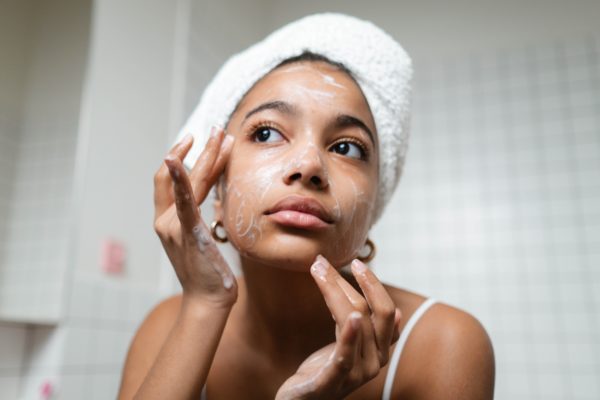How to Take Care of Your Skin?
Types of Skin
It is essential to know your skin for choosing the right skin-care routine. An easy way to discover is to wipe your face with a dry tissue early in the morning soon after you leave your bed to know what type of skin you have, . If there is oil on it, you have a greasy skin and if you have grease only in the centre panel, then you have a combination skin. If there is no grease on the tissue at all, you have either a dry or a normal skin.
To check a dry skin, wash your face with soap and water. If your skin is left feeling stretched or too tight, shiny and parched, it is dry. If the skin feels smooth, shiny and elastic, it is normal. Normally your skin will fall into one of these categories
Normal Skin
A healthy, normal skin is unblemished, velvety, smooth and supple, with no enlarged pores or flaky dead cells. There may be occasional pimples just before menstruation when increased hormonal activity causes the sebaceous glands to be overactive, but acne is certainly not a problem for people with normal skin. In the morning cleanse your skin with plain water, soap and water, face-washing grains or rose water. In the evening remove all your stale make-up with cleansing cream, then apply a mild skin tonic. Always use a moisturizer in the day under your make-up.
Dry Skin
Dry skin is flaky and dull looking, especially on the cheeks and around the eyes; Even in the teens fine lines may appear on the cheeks, under the eyes and at the corners of the mouth. It has a tendency for broken veins, flakiness, dry patches, reddened and sore skin in cold weather. A dry skin needs a lot of care. The oil glands are not supplying enough lubrication to the skin and the skin becomes dehydrated.
If your skin is really dry, adopt suitable measures if neglected, it turns into wrinkles and lines. Cleansing should be done with a cream, followed by a very mild tonic like rose water or a herbal infusion to remove the remaining traces of oil and to have the skin feeling fresh. Wash the dry skin with water and scrub. If you are afraid it will over-dry your skin, use enough of moisturizer afterwards.
Try washing with milk. Instead of soap, you can also use oatmeal or almond meal. Lubricating and feeding are essential for this type of skin. Never go out without a moisturizer at night. If your skin is feeling particularly restore it with a rich nourishing cream, then blot off cream after about twenty minutes. The skin will have absorbed all the cream it can in ten minutes and the excess will only block the pores of your skin.

Creasy Skin
A greasy skin looks shiny, thick, and dull coloured. The sebaceous glands produce more oil than is needed, thus making the face greasy and enlarging the pores. It often has blackheads and is prone to acne. Greasy skin requires more cleansing than other skins. Grease tends to pick up dirt and grime which clog the pores and produce black heads.
Wash the face in the morning, at mid-day and in the night before going to sleep, with soap and water. In the evening remove all traces of make-up with a cleansing cream. Use a mild skin tonic. The toning will improve the circulation and the texture of the skin. Moisturizing a greasy skin is not essential, but you may use a non-greasy moisturizer only in the day.
Combination Skin
Treat this kind of skin as two individual skins. This skin usually has dry cheeks and a greasy centre panel. Cleanse the centre panel with an astringent or strong skin tonic and the cheeks should be treated as you would treat dry skin.
Ageing
Without care your skin can make you look much older than you actually are. In the present age where the science of beauty care is progressing fast there is no reason to be left behind in either knowledge or personal care. There is nothing as flattering as a flawless skin. Women wait for a problem to arise before they start caring for their skin but before they know it, it is gone forever. The skin must be studied individually and carefully, without any make-up, in front of a mirror with adequate light. Every line of your face has a different story.
Even the most flawless skin has problems, such as dry or oily areas, oily patches, clogged pores, uneven colour, allergic phenomena? The skin constantly undergoes changes depending on weather conditions and artificial conditions, environmental pollution, nervous tension, insomnia, tranquillisers, sun and wind. All these factors accelerate to a large extent the ageing process. Cleansing, toning, moisturizing and nourishing are the essential routines to be followed by every woman.
Heat and Cold
Intense cold and extreme heat have a bad effect on the skin. Probably the ideal climate for keeping the skin soft and smooth is a mild and wet one. Heat has a drying and ageing effect on all types of skins, with the exception of oily skin. As the natural oils begin to dry, the skin becomes leathery and tends to wrinkle. The leathery texture and brown pigment are actually the skin’s own natural protection against the effect of ultra-violet radiation.
The solution to this ageing problem is to replace the lost moisture with moisturizing your skin daily. Remember that a light, golden tone to the skin can be just as attractive as a deep reddish brown one. To prevent sun-burn the skin produces Melanin. Exposure to cold also dries and roughens the skin. Sudden exposure to intense cold can produce blotchiness, hasten the appearance of thread veins on the cheeks and sink in a flaky appearance. Moisturizing and make-up the best protection in this case. Do not subject the sudden extremes of temperature. This may produce on the skin and cause chilblains.
Central heating and air-conditioning are both potential enemies of good skin. In such an atmosphere even, a normal skin may rebel. Heavy foundation or make-up becomes cloggy and if secretions build up underneath, spots result. It is wise to keep make-up to a minimum. Do not forget deep cleansing every night and use a cleansing face mask at least once a week to keep the skin fresh.
What’s Wrong with Cleansing with Regular Tap Water?
Salt water is generally good for the skin if the salt is later removed with a fresh-water shower. Otherwise, the salt will make the skin excessively dry and may produce burning. Water from the tap can be good for your skin, depending on the type of your skin and the hardness or softness of the water itself.
If your skin is extremely dry, washing your face in tap water will not be helpful, for the salts and calcium in the water will dry it further. Use a water softener when washing. Beware of using hard water on the face. Use a softening substance such as bath salts or oil for bathing your body. For freshening the face spray in not weather (mineral water is ideal) with a well washed spray bottle and direct it straight on to your skin.


